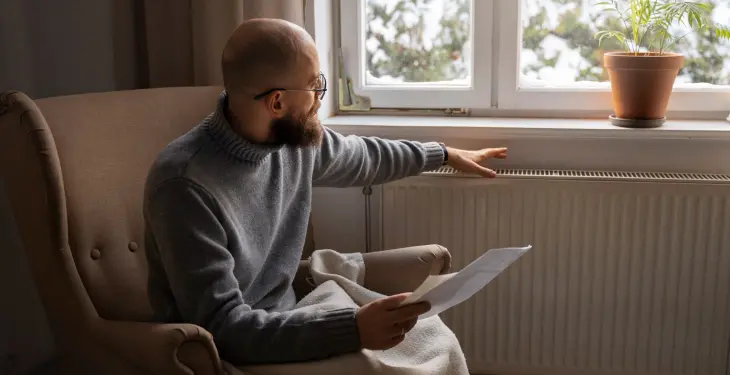

Written by Stephen Day
Gas Safe Engineer
Updated: 11th December, 2025
If your radiators aren’t heating up, it’s usually caused by trapped air, sludge, or a boiler pressure problem.
Get a new boiler quote, save up to £550 per year (0% APR available).
This guide explains what to check, how to fix it safely, and when to call a Gas Safe engineer.
If your radiators aren’t getting hot, it can make your home feel cold even when the boiler is running.
Most of the time, the cause is simple - trapped air, a stuck valve, or low boiler pressure.
Sometimes, the problem is deeper, such as sludge build-up or a faulty pump stopping hot water from circulating properly.
Radiators work by circulating hot water from the boiler through a sealed central heating system.
The water flows through pipes into each radiator, releasing heat into the room before returning to the boiler to be reheated.
If there’s an issue anywhere in this cycle - such as trapped air, blockages, or a faulty valve - the hot water can’t move freely, leaving radiators cold or unevenly heated.
If the top of the radiator remains cold, following a clear step-by-step radiator bleeding guide is often the fastest fix.
A healthy central heating system depends on the right boiler pressure.
When the system is cold, the gauge should read between 1 and 1.5 bar, and around 2 bar when hot. If it drops below 1 bar, the boiler may struggle to push water around the radiators. You can learn more in our guide on what your boiler pressure should be when heating is off
Condition | Pressure range | Notes |
Cold | 1.0-1.5 bar | Ideal before turning on heating |
Hot | 1.8-2.0 bar | Slight increase during operation |
Below 1.0 bar | Too low | Can cause radiators not to heat |
Above 2.5 bar | Too high | May trigger safety discharge |
When radiators don’t heat up but the boiler appears to work, it’s often due to trapped air, sludge, or a circulation issue.
In some cases, one radiator may stay cold while the rest heat up fine, which points to a localised problem like a stuck valve or blockage.
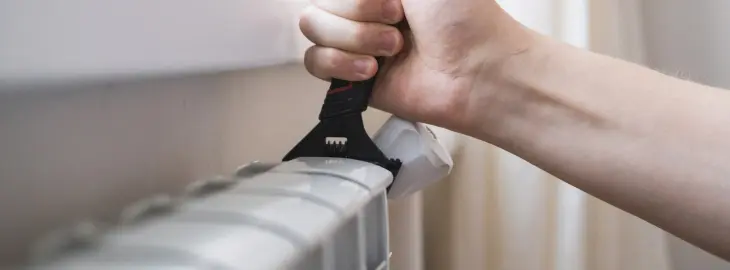
Trapped air is the number one reason for radiators that are warm at the bottom but cold at the top.
Air prevents water from filling the radiator properly, reducing heat output.
Fix: Use a radiator key to slowly open the bleed valve at the top until water starts to flow, then close it. Check boiler pressure afterwards and top up if needed.
Repairable? Yes.
Cost: Free.
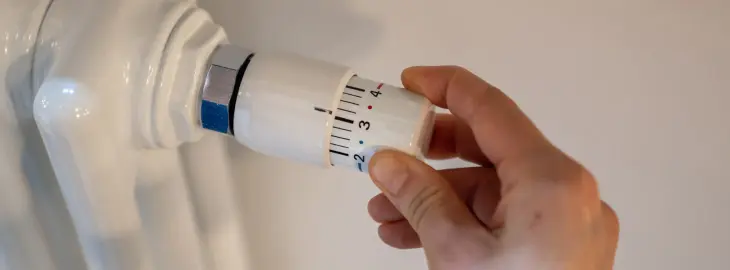
A thermostatic radiator valve (TRV) controls how much hot water flows into the radiator.
If it gets stuck in the closed position - common after long periods without use - that radiator won’t heat.
Fix: Remove the TRV cap and check if the small pin underneath moves freely. If not, gently free it using pliers or a small tap. Replace the valve if it’s seized.
Repairable? Usually.
Cost: £30-£60.
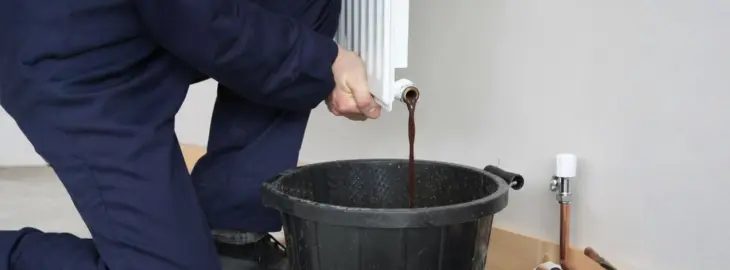
Over time, rust and debris settle inside the system, forming sludge that blocks the bottom of radiators. You’ll often notice cold spots at the bottom and uneven heating.
Fix: A professional power flush will clear sludge and improve circulation. After cleaning, adding a corrosion inhibitor prevents it from building up again.
Repairable? Yes.
Cost: £200-£400 depending on system size.
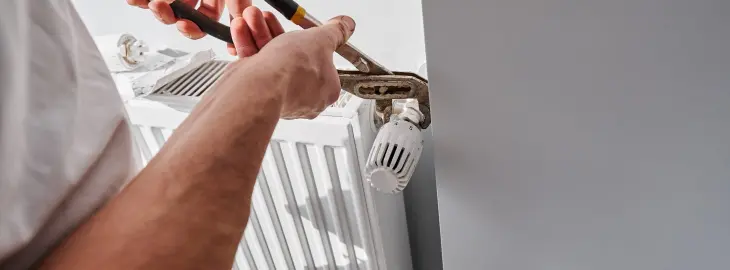
Sometimes one or both valves are turned off accidentally, restricting hot water flow.
Fix: Turn both the inlet and outlet valves fully anticlockwise to open them.
Repairable? Yes.
Cost: Free.
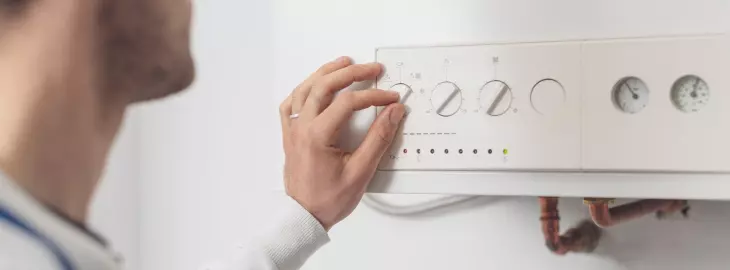
If your boiler pressure is too low, there’s not enough force to circulate hot water through the system.
Fix: Check the pressure gauge. If it’s below 1 bar, top up using the filling loop until it reaches 1 to 1.5 bar.
If pressure keeps dropping, there may be a leak or faulty part that needs an engineer. Our guide on boiler losing pressure explains the common causes and how to fix them.
Repairable? Yes, if repressurising resolves it.
Cost: Free if done yourself, £80-£120 if diagnosed by an engineer.
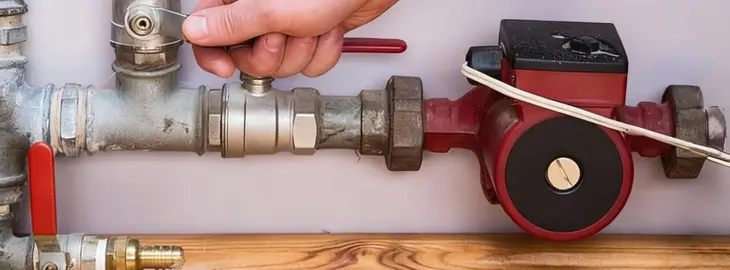
If the boiler is running but radiators remain cold, the circulation pump may be stuck or failing.
Fix: A Gas Safe engineer can check and replace the pump motor if required.
Repairable? Yes.
Cost: £250-£450.
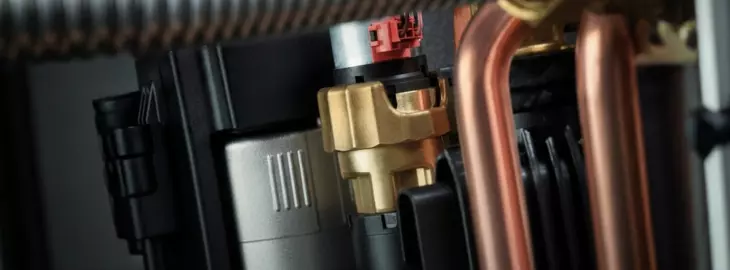
Combi boilers use a diverter valve to switch between heating and hot water. If it gets stuck, the boiler may heat water for taps but not the radiators.
Fix: The valve may need cleaning, freeing, or replacing depending on the extent of wear.
Repairable? Yes.
Cost: £300-£500.
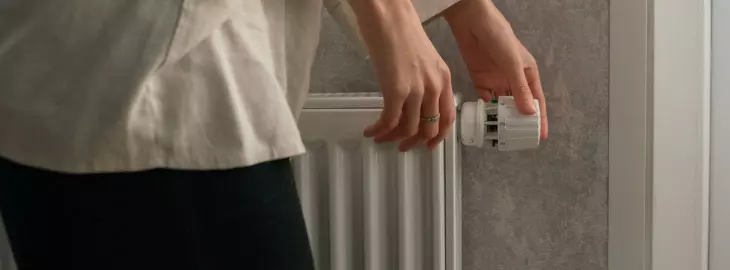
If every other radiator heats normally, one unit may be out of balance, have trapped air, or a stuck valve.
Fix: Start by bleeding it, check both valves are open, and if necessary, rebalance the system by adjusting flow across all radiators.
Repairable? Yes.
Cost: Free to £50 depending on the cause.
Look at your boiler’s pressure gauge. If it reads below 1 bar, the system likely needs topping up. Use the filling loop under the boiler to bring it back to 1-1.5 bar.
Touch the radiator from top to bottom.
Cold top: trapped air
Cold bottom: sludge or blockage
Entirely cold: closed valve or no water flow
Turn both valves on either side of the radiator fully anticlockwise to allow unrestricted flow.
Use a radiator key to release trapped air until water flows steadily. Keep a towel handy to catch drips.
If fitted, remove the TRV cap and ensure the pin moves freely. Clean or replace it if stuck.
Gurgling or bubbling usually means trapped air, while banging or knocking suggests uneven pressure or partial blockages.
This is the easiest and safest fix. It removes trapped air so water can circulate freely. After bleeding, recheck boiler pressure and top up if it has dropped.
If pressure remains low after bleeding, top it up using the filling loop beneath the boiler. Stop when it reaches 1-1.5 bar.
A stuck TRV prevents water entering the radiator. Free it gently or replace it if damaged.
If several radiators have cold spots or stay cool, sludge is likely blocking circulation. A power flush removes build-up and restores efficiency.
Once checks are complete, restart the boiler and allow it to run for 15-20 minutes. Each radiator should heat evenly from bottom to top.
Radiators stay cold even after bleeding
Boiler pressure keeps dropping
Only some radiators heat up
Loud banging or hissing noises
The pump or diverter valve may have failed
A Gas Safe engineer will test the circulation system, check the expansion vessel and pump, and look for internal faults such as stuck valves or leaks.
Typical repair costs:
Pump replacement: £250-£450
Diverter valve replacement: £300-£500
System flush: £200-£400
Book annual boiler and system servicing - A yearly service keeps your boiler efficient and identifies early issues before they affect heating.
Keep pressure between 1 and 1.5 bar - Monitor your boiler gauge monthly. Pressure that’s too low or too high can both cause heating problems.
Use corrosion inhibitors and magnetic filters - Inhibitors protect against sludge and rust, while magnetic filters catch debris before it circulates.
Bleed radiators before winter - Air can collect in radiators during months when heating isn’t used. Bleeding them before the cold season improves performance and efficiency.
Watch for early warning signs - Cold spots, unusual noises, or inconsistent heating are signs your system may need attention. Early action helps prevent costly breakdowns later.
If your radiators aren’t heating up, start with simple checks - bleed them, ensure valves are open, and verify boiler pressure.
If the problem persists, it could be due to sludge, a circulation fault, or a failing valve.
A Gas Safe engineer can diagnose and repair the issue safely, keeping your system efficient and reliable.
Regular maintenance, inhibitor use, and annual servicing will help prevent future radiator problems and keep your home warm all year round.
Last updated: 11th December, 2025

Written by Stephen Day
Gas Safe Engineer at iHeat
Stephen Day is a Gas Safe registered and FGAS certified engineer with over 20 years of hands-on experience in the heating, cooling, and renewable energy industry, specialising in boiler installations, air conditioning, and heat pump systems.
LinkedInArticles by Stephen Day are reviewed by iHeat’s technical team to ensure accuracy and reliability.

19th February, 2026
Selecting the appropriate boiler for your London home involves understanding the different...
 Read Article
Read Article

19th February, 2026
A typical Annual Boiler Service includes a visual inspection to identify any obvious fault...
 Read Article
Read Article

19th February, 2026
Boiler servicing comprises a set of inspections and tests conducted by a qualified enginee...
 Read Article
Read Article
No obligation. Takes less than 60 seconds.